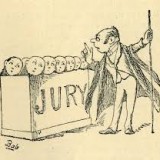Expert did not meet with, examine or interview plaintiff = NO WEIGHT.
On November 30, 2015, the BC Supreme Court rejected the opinion of a defence retained doctor who “did not meet with, examine or interview” the plaintiff but nonetheless authored a report opining on the plaintiff’s injuries. In Preston v. Kontzamanis Mr. Justice Parrett provided the following critical comments for medico-legal practices: [125] The defendant provided and relied upon what purported to be an independent medical report (IME) by Dr. Boyle. [126] Dr. Boyle readily acknowledged that he was not asked to and did not...
read moreJury can know about all defence medical examinations.
On November 27, 2015, the BC Supreme Court confirmed that it is fair game for plaintiffs to testify that they attended a defence medical exam where no report was produced and the defence is not relying on opinion evidence from their expert. In Norris v. Burgess the plaintiff alleged injury as a result of two collisions. The defendants denied any injury occurred. In the course of the lawsuit the plaintiff attended a defence medical appointment with a psychiatrist. The defendants “chose not to obtain a medical opinion from the psychiatrist” and did not call him as a witness. In the course...
read more“Inconsistent” jury award requires a new trial.
On November 26, 2015, a judge of the BC Supreme Court ordered a retrial in a personal injury lawsuit after a jury awarded special damages but denied the plaintiff damages for his non-pecuniary loss. In Harder v. Poettcker , 2015 BCSC 2180, the plaintiff requested a jury trial after suffering injuries in a motor vehicle accident. The jury found the plaintiff 85% at fault for the crash and awarded a total $5,100 in damages (all based on out of pocket expenses) and then awarded nothing for non pecuniary damages. After applying the split of fault this left an award of $765. The trial judge...
read moreRequest for photos of plaintiff’s dancing dismissed.
On November 2, 2015, the BC Supreme Court dismissed a request for a plaintiff to produce various photographs. In Wilder v. Munro the plaintiff was injured in a 2010 collision and sued for damages. In the course of the lawsuit ICBC reviewed the plaintiff’s social media accounts and obtained: “ten separate videos of the plaintiff dancing in rehearsals or shows in 2013, 2014 and 2015, photographs of the plaintiff performing dance moves, Facebook status posts discussing upcoming dance shows and auditions in 2011, photographs and posts about Ms. Wilder’s attendance at music festivals in...
read moreReport must include “all actual instructions received by the expert”.
On October 16, 2015, the Supreme Court of BC addressed the scope of expert instructions that need to be disclosed to make expert evidence admissible. In short the Court noted that a “paraphrased summary of instructions” was insufficient. In Pinch v. Hofstee, 2015 BCSC 1887, Mr. Justice Burnyeat noted that Rule 11-6(1)(c) requires the following: [1] The parties presented a number of expert reports. While some of the expert reports attached the instructions that were provided to the expert by counsel, some of the expert reports merely provided a paraphrased summary of instructions. [2] Rule...
read moreSettlement documents from previous claim need not be produced.
On October 15, 2015, the BC Supreme Court addressed a request to produce documents relating to the settlement of a previous personal injury claim in the prosecution of a subsequent claim. In Gamble v. Brown, 2015 BCSC 1873, the plaintiff was injured in a 2009 collision, brought a claim for damages and ultimately settled. She was then injured in a 2011 collision. In the current lawsuit the defendant requested broad production of the previous file information including “any mediation brief, settlement letter, file memo, communication or similar document”. The plaintiff agreed to produce...
read more









